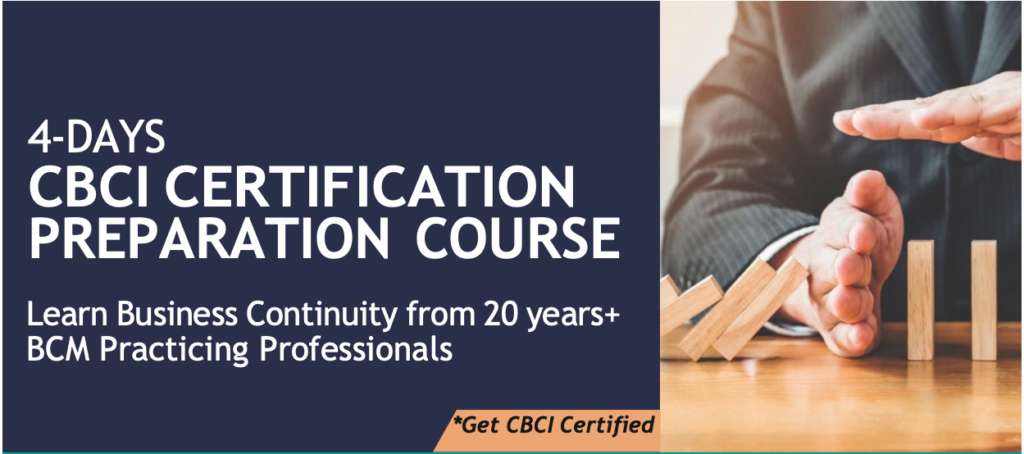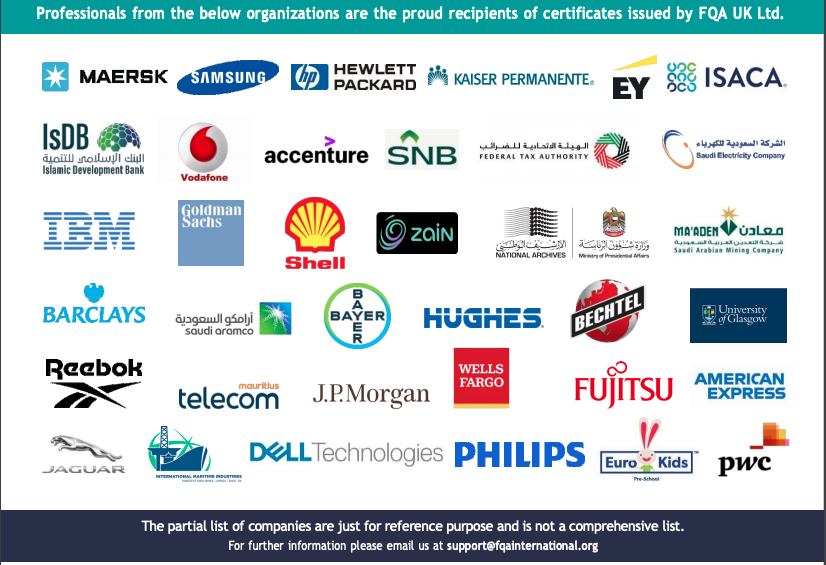
Apart from English, our trainers can deliver this course in other languages also like Spanish, French, Arabic, and Chinese.
What makes us different from any other similar BCM Certification Course is:
- 240 Knowledge Check questions – enough to prepare you well to pass the CBCI exam with good scores.
- One bonus opportunity to review some sample knowledge check questions in the next 1 week post course completion (for corporate inhouse sessions, with more than 12 participants)
- Affordable prices for you to get your entire team CBCI-trained. Special discounts forinhouse courses of batch size 12 and above.
Modules
| MODULE ONE Policy & Programme Management is the Management Practice that defines the organizational policy relating to business continuity and how that policy will be implemented, controlled and validated througha BCM programme. | Participants in this module will learn about : A. Establishing and communicating the business continuity policy B. Determining the scope of the business continuity management system C. Setting up the BCM Program Governance D. Assigning Roles, Responsibilities and Authorities E. Defining the needed documented Information F. Implementing the Business Continuity Programme |
| MODULE TWO Embedding Business Continuity is the Management Practice within the BCM Lifecycle that continually seeks to integrate Business Continuity into day-to-day activities and organizational culture. | Participants in this module will learn about : A. Understanding the relevance of the organization’s culture B. Designing an ongoing BCM training and awareness program C. Delivering the needed training and awareness campaigns |
| MODULE THREE Analysis is the Technical Practice in which the organization defines exactly what it’s BCM program needs to critically focus on, and deliver.ItistheanalysisphasethatdefinesthespecificationsoftheBCMprogramthatwillbebuilt. | Participants in this module will learn about : A. Performing a Business Impact Analysis (BIA) to determine Business Continuity priorities and requirements, including RTO, MTPD/MAO and MBCO B. Evaluating threats to critical activities C. The 4 Risk Treatment categories – Tolerate, Treat, Transfer and Terminate |
| MODULE FOUR Design is the Technical Practice within the BCM Lifecycle of the BCI Good Practice Guidelines that identifies and selects appropriate strategies to determine how continuity andrecovery from disruption will be achieved. | Participants in this module will learn about : A. Identifying and selecting choices for BC strategies and solutions B. Determining resource requirements C. Designing theincidentresponse structure. |
| MODULE FIVE Implementation is the Technical Practice within the Business Continuity Management (BCM) Lifecycle that executes the agreed strategies through the process of developing the Business Continuity Plan. | Participants in this module will learn about : A. Developing comprehensive Business Continuity plans and procedures. B. Understanding the conceptual differences between Strategic, Tactical and Operational plans C. Appreciating specialised plans, such as the Communications Plan, Crisis Management Plan, Disaster Recovery Plan etc. |
| MODULE SIX Validation is the Technical Practice within the BCM Lifecycle that confirms that the Business Continuity Management (BCM) programme meets the objectives set in the Business Continuity (BC) Policy and that the organization’s Business Continuity Plan (BCP) is fit for purpose. | Participants in this module will learn about : A. Putting in place an Exercise and Test program B. Maintaining BCM Program arrangements C. Reviewing BCM arrangements, via Audit, Self-Assessment, Quality Assurance, Performance Appraisal and Management Review |
| MODULE SEVEN | 120 Questions CBCI Mock exam, with detailed question by question discussions – enough to prepare you well to pass the CBCI exam with good scores |
| MODULE EIGHT | One bonus opportunity to retake the 120 questions CBCI Mock exam approx. 1 week post course completion (for Corporate inhouse sessions, with more than 12 participants) |
Note – Each of the modules 1-6 will include a 20 questions knowledge check – so 120 knowledge check questions in all, over the 6 modules. This would help refresh the key points to be remembered, as well as prepare participants to successfully pass the certification exam.

WHO SHOULD ATTEND ?
Auditors and other professionals from BCM related domains such as Crisis and Risk Ma n a g e m e n t , E m e r g e n c y P l a n n i n g , Information Security, Operations, Facilities, Administration, HR, Legal and Compliance
Those who want to pass the CBCI certification exam, and also be able to eventually upgrade themselves to MBCI.
Full-time or Part-time Business Continuity Professionals interested in learning more about BCMGood Practices as per the BCIGPG
BCM Department Champions, Coordinators and Project Managers, who want to get a good understanding of a typical BCM Framework

LEARNING OBJECTIVES
- The value of Business Continuity, and its key drivers
- Relationship of Business Continuity with Crisis Management, Emergency Response and IT Disaster Recovery
- Business Continuity similarities and difference
- Key clauses of the ISO 22301:2019 standard
- Stages of the BCM Life Cycle, such as BCM Project Initiation and Management, Scope, Objectives and BCM Policy, Business Impact Analysis (BIA), Risk Assessment (RA), BCM Recovery Strategies, Business Continuity Plans (BCPs), Testing, Exercising, Annual Internal Audit, Maintenance and Review
- Business Continuity maturity and continuous improvement, through the PDCA cycle
